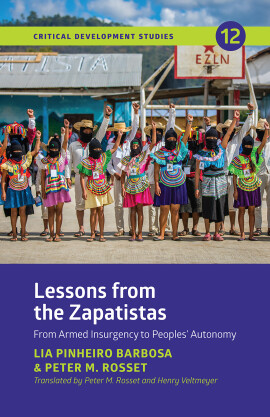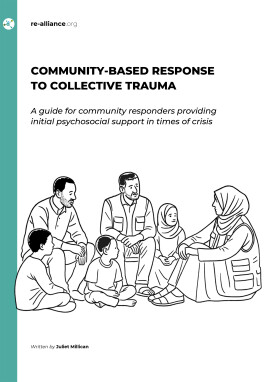
The Barefoot Guide to Learning Practices in Organisations and Social Change
The 2nd Barefoot Guide Writers' Collective
Organisations that are strong and wish to contribute to positive and sustainable social change have to be able to learn. The same is true of individuals who want to have a positive impact on their surroundings. They need to learn – from their communities, from their colleagues, from their mentors.
But how can we go about becoming learning organisations and people? The Barefoot Guide 2 starts by asking the questions: How are we already learning? How can we start to become a healthier learning organisation? What is at the heart of our work? It then leads us through topics such as linking individual and organisational learning, creating a learning culture, community mobilising and development, adult learning, funding, evaluation, facilitation, and creative writing.
The Barefoot Guide 2 is a practical resource for leaders, facilitators and practitioners involved in social change who want to improve and enrich their learning processes. But this is not just another book on organisational learning and social change. It is different in that it was not written by one person, neither is it a collection of essays written by different people. This book is the joint effort of a group of development practitioners from across the globe, all passionate about learning and bringing their different experience and expertise to the book.
The Barefoot Guides are created by writers’ collectives drawn from the Barefoot Guide Connection -- a global and local community of social change leaders and practitioners, from many countries, sharing diverse practices to deepen and develop approaches and initiatives to contribute to a changing world.
Published: 2016
Pages: 223
eBook: 9781780446950
Paperback: 9781853399626
But how can we go about becoming learning organisations and people? The Barefoot Guide 2 starts by asking the questions: How are we already learning? How can we start to become a healthier learning organisation? What is at the heart of our work? It then leads us through topics such as linking individual and organisational learning, creating a learning culture, community mobilising and development, adult learning, funding, evaluation, facilitation, and creative writing.
The Barefoot Guide 2 is a practical resource for leaders, facilitators and practitioners involved in social change who want to improve and enrich their learning processes. But this is not just another book on organisational learning and social change. It is different in that it was not written by one person, neither is it a collection of essays written by different people. This book is the joint effort of a group of development practitioners from across the globe, all passionate about learning and bringing their different experience and expertise to the book.
The Barefoot Guides are created by writers’ collectives drawn from the Barefoot Guide Connection -- a global and local community of social change leaders and practitioners, from many countries, sharing diverse practices to deepen and develop approaches and initiatives to contribute to a changing world.
| 1. First Steps | |||
|---|---|---|---|
| 2. I am. We are | |||
| 3. Lively Spaces | |||
| 4. Moving Tapestries | |||
| 5. Weaving Learning into Change | |||
| 6. Humble Offerings | |||
| 7. Our Feet on the Ground | |||
| 8. Horizontal Learning | |||
| 9. The Heart of Change | |||
| 10. Unlearning | |||
| 11. In the Sea of Change | |||
| 12. Harvesting Experience | |||
| 13. Mirror Mirror | |||
| 14. Writing to Learn. Learning to Write | |||
| 15. Creative Space |
“The Barefoot Guides use simple methodologies that allow people to bring the best of their experiences to share through the book. They show that all we need is to be awake to learn, to create, to innovate and by the end of day we can create a transformational approach. All of us can do it, even those who do not know they can, truly they can do it too… all of us can change lives!”
Mário Albino Machimbene, KEPA, Maputo city, Mozambique
“This exceptional series is hugely accessible yet deeply rooted in solid theory and extensive practice across a wide range of contexts and fields. Expect from it something truly unique in its combination of insight, reflection, experience and highly usable mixed text/visual presentation. It is not “dumbed down.” I have seen it bite as deeply at high academic and professional level as well as at grassroots community leadership level -- an astonishing achievement worth honouring.”
James R. Cochrane, Emeritus Professor, Religious Studies, University of Cape Town, and Adjunct Professor, Dept of Social Sciences and Health Policy, Wake Forest School of Medicine, USA.
“The Barefoot Guides are chock-full of practical wisdom. It has given more legitimacy to a way of working that has always felt ‘true’ and ‘right’ to me intuitively and that I have seen the effectiveness of in action.”
Tana Paddock, Organization Unbound, Cape Town, South Africa
“The Barefoot Guide Connection has a unique and truly transformational approach to collaboration, learning and facilitating social, transformational change across borders.”
Tobias Troll, Director, EDGE Europe at EDGE Funders Alliance, Brussels, Belgium
“The Barefoot Guides are an important reference for our international students in development studies. Crossing the border between academia and practitioners, they repeatedly prove to be a rich source of inspiration for those working with local communities and grassroots organizations”
Dr Kees Biekart, International Institute of Social Studies (ISS) of Erasmus University, The Hague, Netherlands
“The Barefoot Guides are a wonderful contribution to open access knowledge, grounded on a great depth of experience and horizontal learning from across the world.”
Samantha Button, Maliasili Initiatives, Tanzania
The 2nd Barefoot Guide Writers' Collective
The Barefoot Connection is a global team of collaborating practitioners and activists from the Community Development Resource Association (South Africa), Voluntary Service Overseas (Nepal, Cameroon, Canada), ActionAid (Ghana, India), the Treatment Action Campaign (South Africa), the Church Land Programme (South Africa), and independent practitioners. Valuable contributions were also received from The Democracy Development Programme (South Africa) and Oxfam UK.





